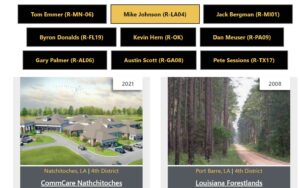Today, the New Markets Tax Credit (NMTC) Coalition provided an updated analysis of U.S. Department of Treasury data on the investment and creation of jobs in low-income communities nationwide. This data indicates that between 2003 and 2015, NMTC financing resulted in over one million jobs in low-income rural towns and urban neighborhoods—areas struggling with lagging economies and high rates of unemployment. The Coalition published new federal NMTC impact data by state on its website, which will be featured in a larger report on the economic impact of the credit that is to be released in December.
Established in 2000 in the Community Renewal Tax Relief Act (P.L.106-554), the NMTC is the product a bipartisan effort to stimulate investment and economic growth in low-income urban neighborhoods and rural communities. The NMTC works by providing a shallow federal tax credit of 39 percent, taken over seven years, for private sector investments made in census tracts where the individual poverty rate is at least 20 percent or where median family income does not exceed 80 percent of the area median.
Between 2003 and 2015, $42 billion in NMTC investments leveraged over $80 billion in total investments. Further 72 percent of that NMTC activity was in highly distressed communities, which far exceed the programmatic requirements for development in economically distress areas.
“This new Treasury data shows the NMTC is a significant catalyst for job creation, creating more than one million jobs in some of the nation’s poorest and most distressed communities. Further, when we release our full study in December, it will also show that economic activity instigated by NMTC projects also generates enough new tax revenue to cover the cost of the program to the federal government,” said Bob Rapoza, spokesperson for the NMTC Coalition. “However, despite the reach and results of the NMTC, the future of the credit is in jeopardy.”The NMTC was most recently provided a five-year authorization in The PATH Act. (P.L. 114-113) in December 2015. However, the House of Representatives today passed a tax reform bill, H.R. 1, which would repeal the 2018 and 2019 authorizations, potentially depriving communities of a key tool to promote job growth and business opportunity in communities left outside the economic mainstream.
The Senate Finance Committee has taken an alternative approach, maintaining the NMTC. In addition, two senior members of the Finance Committee filed amendments earlier this week to make the NMTC permanent—Senators Rob Portman (R-OH) and Ben Cardin (D-MD). NMTC practitioners applaud this move but note that low-income communities need additional access to the NMTC to generate business growth and to build and sustain healthier economies.
The Portman and Cardin amendments would provide similar expansion and improvements as outlined in the New Markets Tax Credit Extension Act of 2017, H.R. 1098 in the House and S. 384 in the Senate. There are presently 13 Senators signed on in support of S. 384, which was introduced by Senators Roy Blunt (R-MO) and Ben Cardin (D-MD). H.R. 1098 has over 90 cosponsors, led by Reps. Pat Tiberi (R-OH), Tom Reed (R-NY), and Richard E. Neal (D-MA), who is the Ranking Member on the Ways and Means Committee.
“No other the federal tax incentive is generally available to economically distressed rural and urban communities to promote economic revitalization. As Congress grapples with the fate of the NMTC in their tax reform bills, we hope the policymakers will examine this evidence of the tax credit’s effectiveness and the need for new investment in our country’s struggling and forgotten towns and inner cities, and preserve and expand this important tool for job creation and economic revitalization,” Rapoza said. “The NMTC is a very good deal in terms of federal investments.”
For examples of how the NMTC is making an impact in each state, see the NMTC Coalition’s NMTC at Work in Communities.
Media Contact: Ayrianne Parks
(202) 393-5225






